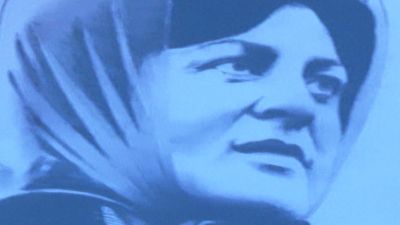Blue Plaque honours 'Headscarf Revolutionary' at her former home in Hull

A blue plaque in honour of Lillian Billocca, the leader of the so-called 'headscarf revolutionaries' has been unveiled outside the house where she lived.
Mrs Billocca died in 1988, but her son, who unveiled the tribute alongside Hull's Lord Mayor, Councillor Lynn Petrini, thanked everyone who had raised funds to pay for the plaque.
The campaign was launched last November to get "Big Lil," as she was fondly known, recognition for her part in saving countless lives - she demanded that Prime Minister Harold Wilson should introduce bold improvements to safety measures across the fishing industry.
As a result of her campaigning, a radio operator became compulsory on each vessel, more safety equipment was made available and undermanned trawlers were prevented from going to sea.
But her action cost her her own job in the fishing industry.
Bilocca and other fishermen's wives were incensed by the continuing loss of men in what was the world's most dangerous industry. 6000 fishermen had been killed working on trawlers - approximately 1 per week, and following Hull's Triple Trawler Tragedy in 1958, Bilocca is said to have uttered her now famous slogan "Enough is enough."
From mid January, 1958, in atrocious North Atlantic seas, three trawlers, from the city’s Hessle Road fishing community, sank in as many weeks. 58 men perished across 26 days.
One of these ships, the St Romanus, did not have a radio operator on board. Amazingly this was not illegal.
Hull was a city in shock, the tragedy was the final straw for the Fishwives. Christine Jensen, Mary Denness and Yvonne Blenkinsop joined Lillian Bilocca to form the Hessle Road Women’s Committee after a mass meeting ended with hundreds of women storming the trawler owners’ offices.
Days later, trade unionists and Labour politicians, arranged for the women to meet with ministers.
They took with them 10,000 signatures on a “Fishermen’s Charter” which demanded radio operators for all ships, better weather forecasting, training for young deckhands, more safety equipment and a “mother ship” with hospital facilities to patrol with the fleet.
Everything the women asked for was granted by ministers following the meeting. Upon the four women’s return to Hull, Mary Denness was quoted as saying, ‘We have achieved more in six weeks than the politicians and trade unions have in years.’
Mrs Bilocca led one of the biggest and most successful civil action campaigns of the 20th century. The most dangerous industry on Earth was changed for the better in days, and the world’s eyes were on Hull for a story that took Vietnam off the front pages.